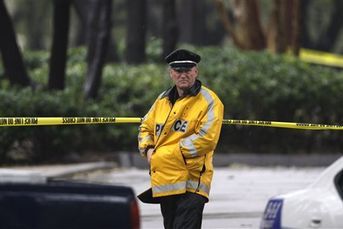Hoping when the ball drops, a bomb doesn’t
Irene Dec’s plan for New Year’s Eve this year doesn’t involve swing dancing or watching the ball drop…
Irene Dec’s plan for New Year’s Eve this year doesn’t involve swing dancing or watching the ball drop in Times Square.
As manager of the year 2000 project at Prudential Insurance Co. of America, Ms. Dec will be holed up in the company’s global control center in Roseland, N.J., not far from its Newark headquarters, monitoring the company’s mainframes and networks around the world — all night. The company has even ordered her a cot in case she needs a quick power nap.
Ms. Dec, 48, has no gripes about working away the last night of the century that starts with 19. She says she’s anticipating the date change the way a runner looks forward to the last mile of a marathon. “After spending so much time on this project, I consider watching our locations around the world start their computer systems back up after the date change the most exciting thing I could be doing this New Year’s Eve.”
Considering what’s on the line for Prudential, Ms. Dec’s enthusiasm makes sense: Prudential has more than 30 million customers in 30 countries representing $375 billion. An unforeseen snag could result in the loss of millions of dollars.
“As a company we’re confident,” says Ms. Dec. “We’re more worried about individuals overreacting and taking their money out and putting it under their beds.”
Prudential began pouring money into its year 2000 project in 1995, when chairman Arthur Ryan declared fixing the millennium bug a “critical priority.” By the time the project ends, officials predict, it will have spent about $230 million.
For New Year’s Eve weekend alone, which the company refers to as “rollover weekend,” Prudential will have on site or on call 2,250 employees and 400 consultants. It has also reserved 125 hotel rooms and ordered 135 cots.
Ms. Dec, an 18-year veteran of Prudential, says she was tapped for the job because of her strengths as a project manager. “Given the large scope of Y2K, they thought I’d be able to dissect it into manageable compartments.”
Prior to taking on the Year 2000 operation, Ms. Dec handled a number of technology services projects, including one which involved incorporating the company’s new technologies into its marketing offices across the country.
But the bulk of her management skills come from a teaching career. After receiving her bachelor’s and master’s degrees in math, she taught high school for six years in New Jersey, followed by two years as an adjunct math professor at her alma mater, Montclair State University.
Ms. Dec joined Prudential in 1981 as a computer programmer. After two years she began managing technology projects.
“It’s the biggest program most companies will ever have,” she says of her current post.
Ms. Dec’s Y2K report card so far has been excellent.
Dale Vecchio, research director for the year 2000 at Gartner Group Inc. in Madison, Conn., says Prudential’s readiness for the millennium bug receives a “five” on the research company’s one-to-five scale (one being the least prepared). “Prudential has been a pioneer in solving Y2K and a lot of that has to do with Irene,” he says.
“Prudential has been on the forefront of the Y2K issue, and a lot of companies have looked to it for the best practices in solving the problem. Irene’s done a heck of a job,” adds Kazim Isfahani, Y2K analyst at Giga Information Group Inc., a technology research firm in Cambridge, Mass.
Ms. Dec has also presented at more than 60 year 2000 conferences and seminars over the last couple of years, and has consulted with other major U.S. companies and government agencies on the problem.
The only real concern Ms. Dec has is the Y2K readiness of Prudential’s 2,000 business partners.
The company will monitor its partners to determine if they are have problems, Ms. Dec says. Prudential also developed a year 2000 business kit for small businesses describing the best practices for becoming Y2K compliant. Ms. Dec maintains that year 2000 will be a “non-event” to Prudential’s customers.
Beginning at 7 a.m. on Dec. 31, Ms. Dec will work 24 hours straight. Japan leaves the 1900s first — at 10 a.m. Eastern time –and its systems’ status will be fed directly into the company’s global command system.
The command center is a large room with a half-dozen rows of tables, arranged in a semi-circle, facing three large video screens. Seated at the tables are specialists in different platforms who monitor their systems and hardware.
74,854 desktops to dust
Ms. Dec says the company will use the center to observe the company’s 21 mainframes, 4,095 servers and 74,854 desktops in 1,466 locations around the world. About 35 computer specialists work in the command center regularly and there are 5,200 others worldwide.
On New Year’s weekend, each Prudential location will shut down its systems from 11: 30 p.m. local time on Friday to 12: 30 a.m. on Saturday and then follow a standard time schedule for rebooting each application. Each site’s experience will be reported to the command center.
Most problems, if they occur, will be handled by the local staff or the command center, Ms. Dec says, adding that the command center resolves 90% of problems without going outside the company for assistance.
Ms. Dec says Pru has very little contact with areas of the world that most concern Y2K analysts, such as China, Malaysia, Russia and some other Eastern European countries.
By Monday morning Ms. Dec says the she will know 50% to 60% of the rollover’s effect. After the first week of 2000 they’ll be certain of 85% of their systems. The rest will be known from business operations that don’t start until the end of the first quarter.
The project ends March 1, and Ms. Dec says she’s already meeting with senior executives at Prudential to decide what she’ll do next.
In 2000 she plans to return to her roots and work more with the schools in New Jersey. This year Ms. Dec has given four presentations to high school students, using her knowledge of computers to segue into other topics such as geography and technology.
She says she will “absolutely” look to get back into teaching when she retires “sometime down the road.”
“My parents came from Poland after World War II, and being a first generation American student, I was encouraged to study harder and learn more,” she says. “I believed that if you went after your dreams you could accomplish anything. And I still do.”
Learn more about reprints and licensing for this article.






